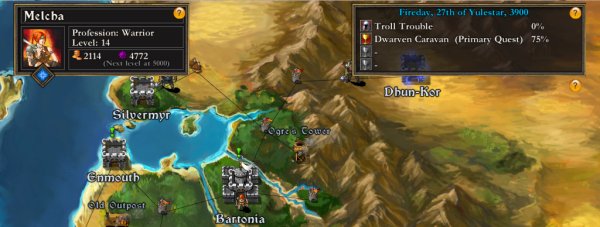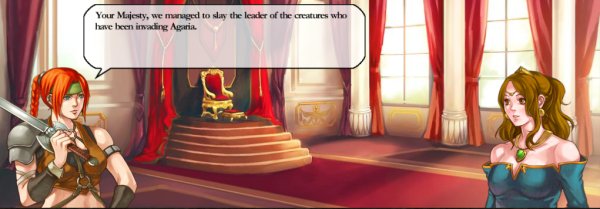RPS Advent Game-o-Calendar: December 12th
Chocolate. There's got to be some around here somewhere. There's none in the cupboard. There's none beneath the desk. There's none in any of the RPS-towers crates. There's no chocolate any-bleeding-where. I give up. Better open a window on our Fairtrade advent calendar.
Mein Gott! What's this?
IT'S CHOCOLATE. Om nom nom nom!
Since I'm sated, you better be too.
It's: Puzzle Quest: Challenge Of the Warlords!
Of the puzzle game troika that's dominated our affections this year - Bookworm Adventures, You-know-whattle and this - Puzzle Quest is the one that is closest to the perception of "traditional" PC game. The other two are deliberately quick-fire games that abstractly you can play quickly, and only their immense charm leads to you playing for hours on end, Puzzle Quest is - from the off - looking for a long-haul. In fact, despite its DS incarnation initially attracting attention, it's roots are buried deeply in the PC. Don't let the Manga-styled artwork distract you. It's actually set in the none-more-geek Warlords universe - of Warlords and Warlords Battlecry fame - and is even the work of the same designer, Steve Fawkner. And, in terms of the resultant game, it's as big a surprise if Gary Grigsby decided his new game should be a rhythm-action dancemat game based around the collected work of Abba. Or if Miyamoto decided to convert a Dostoevsky into a hyper-serious hex based war game (Super Karamazov Brothers, perhaps). Or something.
Frankly, Puzzle Quest is a stroke of genius. Take a standard light RPG - including weapon collection, combat, quests, sieges, crafting, training pets and whatever - and wherever they'd be any kind of conflict resolutin, lob in a game of Bejeweled.
That he thought of it is a Miracle. That it works is a second miracle. Seriously, someone call the Vatican. Someone, somewhere needs to beatified.
The standard game sees your character facing off against a creature. If you create a line of skulls, you damage the opposition. If you create a coloured line, you gain mana of that colour, which can be used to power your special abilities. If you get purple stars or gold, you gain extra experience points or gold respectively. Instead of taking a move, you can use one of your powers. And the enemy are doing exactly the same thing.
It's very simple, but - by adding this second level of characters above the conflict - leads to a unique set of tactical challenges on the situation. For example, depending on what character class you take, you gain a different set of abilities. This means you'll need to harvest a different set of mana to power them - so, for example, as a Warrior you'll be trying to get as much red mana as possible, required for your best attacks. Depending on what equipment you've picked up leads to other considerations too - for example, the regeneration-aiding troll rings require you to keep your blue-mana reservoir above a certain level to start your wounds closing up. So, do you go for red or blue first, given the choice? Of course, each /enemy/ also has their own abilities and mana-interests. Playing defensively, you can choose to deny enemies the resources they require - for example, fire elementals abilities burn through red mana, including being able to use it for hit points. STOP THEM GETTING RED MANA AT ALL COSTS.
You're also amazed that they find subtle variations of bejeweled games to simulate the different tasks - so, while you'll be using the same mechanics to craft runes or capture monsters or whatever, there's enough little differences to keep things fresh. For example, when crafting, rather than just clearing lines, you have to clear the entire screen, turning it into something much more akin to a straight puzzler. Puzzle Quest is a game which has absolute faith in its choice of mechanics. That playing Bejeweled to simulate kicking the living shit out of a troll never once seems ludicrous is a sign of the upmost faith it keeps in itself.
It's not quite perfect, but its failings are the sort of things which are only brought up by people who've played it for twenty hours. And - y'know - if you've got twenty hours of fun out of a game, it's not that bad. For example, there's nagging suspicions that the AI cheats by precognisantly knowing what gems are going to fall into the board, so setting off mass combos. I suspect it's wrong - but it's a side effect of the game's intrinsic unpredictability. Your get strokes of luck, good and bad, and - when they involve line after lines exploding in hyperbright visuals, and hit-points plummeting, it's easy to curse cheating AI.
Or it may just be cheating.
I honestly don't care. It's too much fun to care. If you haven't played it, the demo's available here and to purchase from here. It's fascinating, for me, by being the best example of how the structure associated with one sort of game can be used to enliven and add meaning to a completely different sort (For example, that it took until Unreal Tournament 3 to try and insert a story into the single-player amazes me. It's not as if there are a dozen interesting single-player approaches people use in 1-on-1 fighting games to distract the fact you've been button mashing for the past 20 years).
It's not the best puzzle game in the world. And it's certainly not the best RPG in the world. But it's the best Puzzle Quest in the world, and that's all that matters.
The experience is the point.
(That Experience Points pun sooo didn't work - Gillen's Subconscious)





